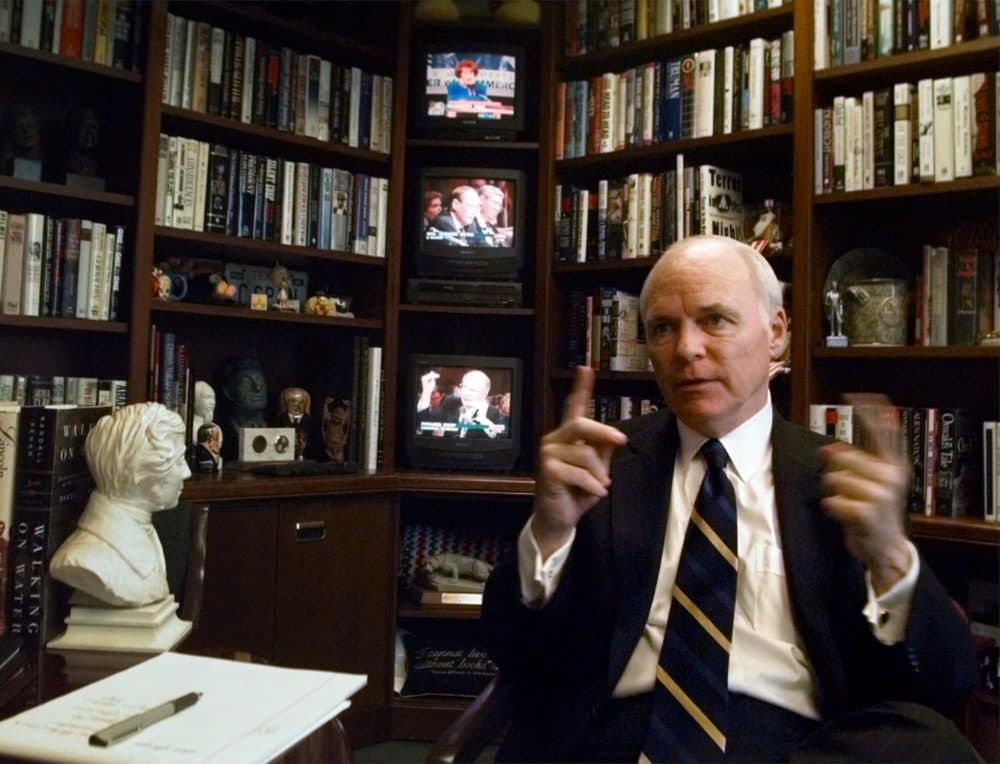Advertisement
Celebrating 40 Years Since C-SPAN's First Broadcast

Forty years ago this week, C-SPAN made its debut.
The nonprofit Cable Satellite Public Affairs Network aired its first broadcast back in 1979, offering America a window into the world of Washington. The network launched with a speech from then-Tennessee Rep. Al Gore.
“Television will change this institution, Mr. Speaker, just as it has changed the executive branch,” Gore said on the broadcast. “But the good will far outweigh the bad.”
The founder of C-SPAN, Brian Lamb, became the network’s signature voice. The beginnings of the network marked a turning point in American politics, similar to what we are witnessing now with social media, Lamb tells Here & Now’s Jeremy Hobson.
“It was a change in the way we were able to hear our politicians and those that are interested in the governmental process,” says Lamb, who is now executive chairman of C-SPAN.
While he wouldn’t characterize the impact of C-SPAN on politics as "bad," Lamb says the launch of the network did have “some unintended consequences.”
“But I think that in the end, the fact that we can now hear, see how our money's being spent means that it's an overall positive,” he says. “But it's not all positive because television does change the environment no matter what we think, and everybody is going to decide whether it's been good or bad on their own terms.”
First Televised Session Of The House Of Representatives
Interview Highlights
On early pushback from lawmakers who didn’t want to be on television
“It wasn't that we got pushback, but the process is cumbersome. And the some of the older members weren't sure that television was a good idea, including the [House] Speaker Tip O'Neill. But he completely changed his mind, and in the end when they voted, he was very much in favor of it. I think they were a bit worried that only certain people in the media would have their hands around this thing, and they wanted it as open as possible. And the fact that we said, 'If you go on television, we'll transmit the whole thing out to the cable systems,' might have made a difference. I'm not even sure because at the time they had the vote it was overwhelmingly positive.”
Cher Calls Into C-SPAN
On the idea that C-SPAN influenced the theatrical nature of modern politics
“I doubt ... it's our fault, although we may have played some role in it. If you go back to the very early days, it changes the nature of the room. And the difference is that when we came along, we were going to televise 2,000 hours of hearings over a year, instead of just something that somebody on Sixth Avenue in New York decided was important like the Vietnam War. They gave a tremendous amount of attention to former Sen. Bill Fulbright's hearings, only one side, and our effort was to give you every side that we could get our hands around. And that seems to me to be a better deal overall for people than just having a hearing once every couple of years because somebody got excited about an issue.”
Brad and Dallas Woodhouse's Mother Calls In
On what sparked Lamb’s interest in politics
“My dad was a beer distributor, and beer distributors in the state of Indiana were regulated. And I watched my father, it was not dishonest, but I watched my father give money to both Democrats and Republicans, and then become furious when the side that won that he supported didn't support the beer business. And it was a very, very good lesson up close, and I used to say to my dad, 'What do you expect? You gave money to both sides. Somebody is going to be against you.' He was a great guy, but the system was completely broken back in Indiana when at one point, every worker of government in Indiana had to give 2 percent of their income to the party in power.”
On if C-SPAN has a place in the changing political landscape
“I hope so. We are here because private business in the name of cable television operators and people who owned the systems 40 years ago said, 'We're going to do something other than movies and sports.' ... People are not subscribing to cable in the same numbers they used to, and the country hasn't decided what it really values when it comes to communications, and this is a very critical period now. So I'm an old man, and I'm not sure I'll be around when the final decision is made, but I just hope that people continue to be interested enough in their government that we can afford to do what we do here at C-SPAN.”
President Reagan Call to C-SPAN
Ciku Theuri produced and edited this interview for broadcast with Kathleen McKenna. Samantha Raphelson adapted it for the web.
This segment aired on March 20, 2019.
